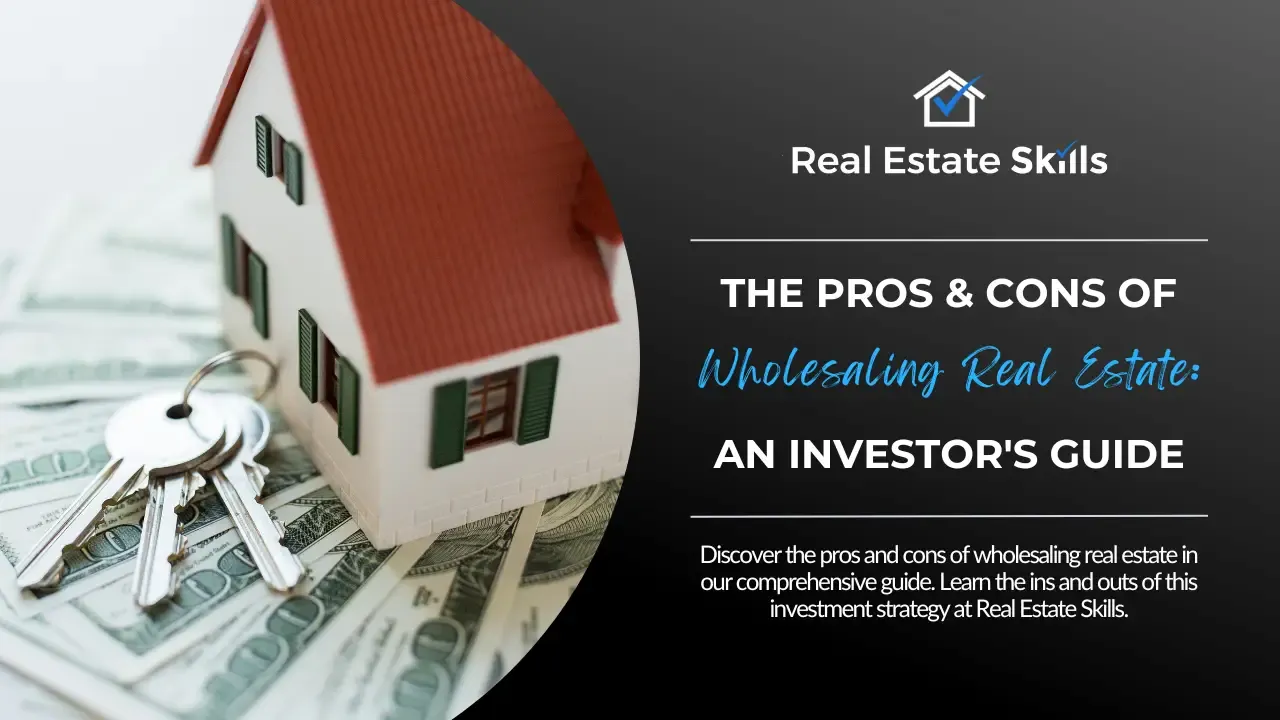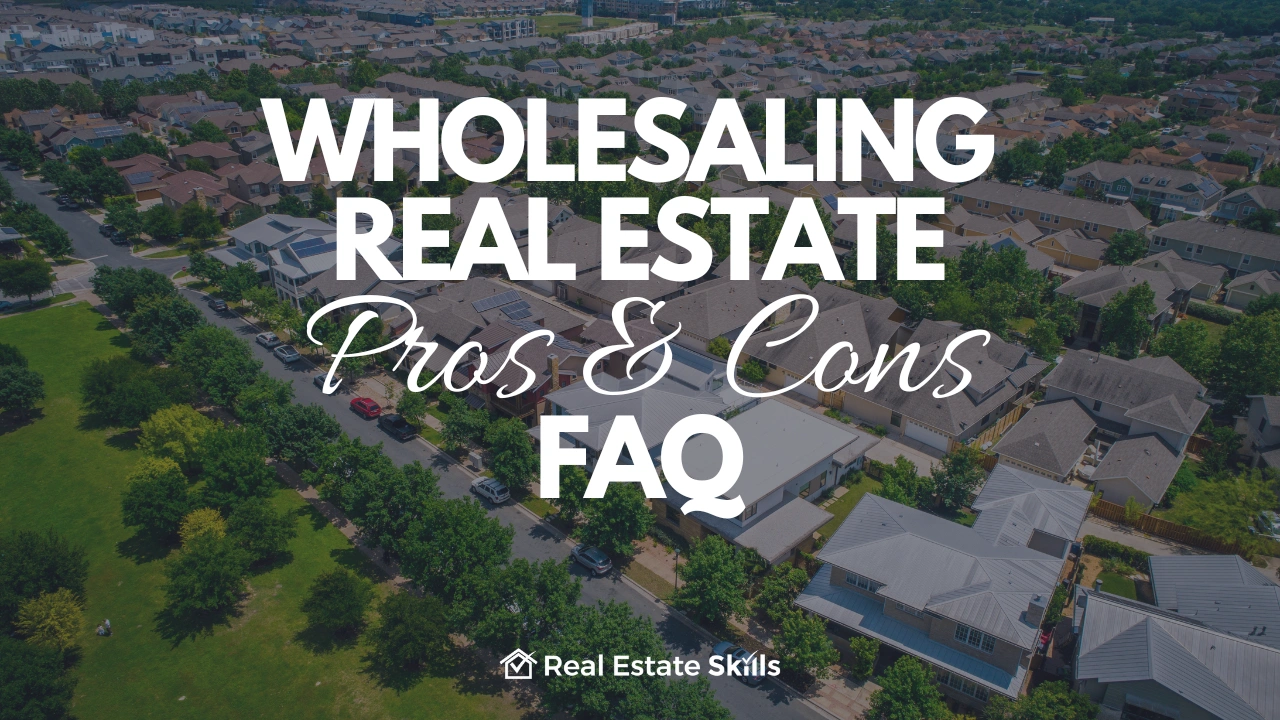
The Pros & Cons Of Wholesaling Real Estate: An Investor's Guide
Sep 24, 2025
Understanding the pros and cons of wholesaling real estate is essential before jumping into one of the most accessible strategies in the investing world. Real estate wholesaling has become a popular exit strategy for investors looking to generate income without purchasing or owning property. Whether you're brand new or experienced, the low barrier to entry and quick turnaround times make wholesaling an appealing real estate investment strategy.
But as promising as it may seem, wholesaling isn’t without its challenges. From legal limitations to deal consistency, this strategy—like all others—has trade-offs every investor should consider. That’s why we created this guide: to walk you through the advantages and disadvantages of wholesaling real estate so you can decide if it’s the right fit for your goals.
Ready to explore the upside and potential pitfalls of wholesaling? At Real Estate Skills, we’ll break down everything you need to know about the pros and cons of wholesaling real estate, including:
- What Is Wholesaling Real Estate?
- Pros & Cons Of Real Estate Wholesaling
- Is Wholesaling Real Estate Right For You?
- Wholesaling Real Estate Pros & Cons: FAQs
- Final Thoughts On The Pros & Cons Of Wholesaling
If you’re serious about doing your first real estate deal, don’t waste time guessing what works. Our FREE Training walks you through how to consistently find deals, flip houses, and build passive income—without expensive marketing or trial and error.
This FREE Training gives you the same system our students use to start fast and scale smart. Watch it today—so you can stop wondering and start closing.
What Is Wholesaling Real Estate?
Wholesaling houses have emerged as a popular investment strategy within the housing sector, fueled by its ability to generate quick profits. This particular real estate investing strategy offers many advantages, including rapid turnaround times, minimal capital requirements, and a relatively straightforward approach, making it an ideal starting point for beginners.
Wholesalers serve as vital intermediaries (aka the middleman), connecting cash buyers to motivated sellers facing foreclosure or other urgent situations. Due to the nature of their real estate business, wholesalers aim to facilitate a real estate transaction that might otherwise have never occurred.
However, before connecting property owners with potential buyers, they must promise the current owner they can find a buyer for the home at a predetermined price. Not only that, but the wholesaler must also acquire the sole right to buy the house. Once they control the property purchase rights, wholesalers transfer these rights to other buyers, pocketing a modest profit.
The term "wholesaling" accurately captures the role of wholesalers: acquiring investment properties below market value and transferring them to other investors at fair prices. When executed effectively, this step-by-step process benefits all parties involved. The current homeowner gets the proceeds they want, the end buyer secures their next deal with an attractive after-repair value, and the investor earns a wholesale fee that they negotiated with the home buyers. Thus, everyone in the deal gets what they want.
Now that we’ve identified what wholesaling is, let’s look a the pros and cons of real estate wholesaling.
Why Wholesale Real Estate?
If you’ve been waiting for the perfect time to get started in real estate, this is it—and wholesaling real estate is one of the smartest ways to begin. With home prices rising and inventory tightening, many investors are struggling to find good deals through traditional methods. The median home value in the U.S. is now $361,263, a 2.1% increase year over year. That means competition is fierce—but wholesaling gives you an edge by targeting off-market properties before they ever hit the MLS.
Even more compelling is the opportunity to work with distressed properties, where sellers are often motivated to close quickly. Nationally, there are 243,501 properties currently in foreclosure, 13,897 bank-owned, and 55,045 headed to auction. These situations create ideal conditions for wholesalers to step in, provide a solution, and assign the deal to a cash buyer—often within days or weeks.
Whether you're looking to earn your first deal or scale a real estate business with minimal capital, wholesaling real estate offers a fast, flexible, and low-risk path to profitability. It’s one of the few strategies where hustle and strategy matter more than how much money you have in the bank.
Pros & Cons Of Real Estate Wholesaling
Before you dive into your first deal, it’s worth taking a moment to explore the pros and cons of real estate wholesaling. On the surface, this strategy sounds like a dream—quick profits, no need to buy property, and a relatively low-cost way to break into the real estate game. But like any business model, it has its ups and downs, and it’s important to understand both sides before deciding if it’s right for you.
If you’ve been asking yourself, “what is wholesale real estate?” or “is real estate wholesaling legit?”, you’re not alone. These are common (and valid) questions—especially for new investors who are trying to figure out where to start. The good news? Yes, wholesaling is legit. Yes, it can be profitable. But there are definitely challenges you’ll want to be aware of before you jump in.
So, is wholesale real estate worth it? That depends on your goals, your risk tolerance, and how prepared you are. In the next section, we’ll break down the most important pros and cons of real estate wholesaling, so you can make an informed decision and set yourself up for success from day one.

Pros Of Wholesaling Real Estate
There are several benefits of wholesaling real estate, not the least of which include the following:
- Quick Profits
- Little To No Cash Or Credit Score Requirements
- Low Barrier To Entry
- Limited Risk
- Gateway Investment Strategy
Quick Profits
One of the biggest pros of wholesaling real estate is the speed at which deals can be completed. Unlike traditional investing strategies like flipping or rehabbing, wholesaling houses often requires minimal renovation work—or none at all—allowing investors to connect motivated sellers with cash buyers in a matter of days or weeks. While there’s no fixed timeline, many wholesale real estate deals can be executed in just a few hours to a few weeks, depending on the market and the investor’s buyer network.
This fast-paced model is ideal for those focused on short-term real estate investing. The ability to turn deals quickly means wholesalers can reinvest profits faster, pursue multiple deals simultaneously, and build momentum without tying up large amounts of capital. For comparison, a fix-and-flip project may take several months to complete, while a wholesale deal can deliver profit in a fraction of the time.
This efficient wholesale real estate strategy not only facilitates quicker cash flow but also supports a scalable business model, making speed one of the most attractive benefits of wholesaling real estate. For investors looking to generate consistent income and stay active in a fast-moving market, the quick turnaround is a serious advantage worth considering.
Little To No Cash Or Credit Requirements
While there are exceptions (like earnest money and double closings), the overwhelming majority of wholesale deals require little to no cash flow or credit on the investor’s behalf. Assigning a wholesale real estate contract instead of purchasing real property navigates around needing a real estate license, Realtor, substantial upfront capital, or a strong credit profile. As a result, both new and seasoned investors will find unique advantages for their particular situations.
On the one hand, the lack of required capital and credit essentially democratizes the entire wholesaling industry, allowing anyone—regardless of their financial resources—to partake. A distinct lack of money is no longer an obstacle for anyone aspiring to wholesale distressed properties.
Seasoned investors, on the other hand, may allocate their untapped capital toward other wealth-building investments. By wholesaling without significant upfront capital or the help of lenders, those with more access to capital can put their money to work in different ways to maximize their profits.
Read Also: Hard Money Lenders 101: What Are They & How To Find Them
Low Barrier To Entry
As previously discussed, new wholesale real estate investors won’t find the need for capital to be too much of an obstacle to overcome, making it relatively easy to break into the wholesaling industry. On top of that, however, wholesaling requires the least amount of experience—relative to rehabbing and scaling an entire rental portfolio.
That’s not to say wholesaling is easy, only that it requires less experience and knowledge in the real estate sector than other exit strategies. Whereas rehabbing and owning rental properties need substantial capital, credit, and expertise, wholesaling allows individuals to enter the market with minimal resources.
Due to its relative ease, wholesaling allows anyone and everyone to participate in the real estate market and build wealth without becoming a real estate agent. Perhaps even more importantly, the level of difficulty—or lack thereof—facilitates entrepreneurship, encourages individual thinking, and provides a platform for individuals to pursue their financial freedom.
Limited Risk
One of the biggest reasons new investors are drawn to wholesaling is its reputation as a low-risk real estate investment. As a beginner-friendly strategy that requires little to no upfront capital or credit, wholesaling offers a relatively safe entry point into the world of real estate. While all investments carry some risk, wholesaling real estate exposes investors to significantly less financial danger compared to flipping houses, buying rental properties, or new construction.
That said, the pros and cons of wholesaling real estate aren’t just about money—time matters too. Although you may not be putting much capital on the line, wholesaling can become a time drain if you’re not focused or working efficiently. Wasting time on unqualified sellers, unmotivated buyers, or bad deals can hold you back from scaling your wholesale real estate business.
Still, for investors who want to minimize exposure while learning the ropes, wholesaling is one of the most forgiving real estate investment strategies. Mistakes tend to be educational rather than costly, making it a great model for those who want to gain experience, build confidence, and grow smarter with every deal.
Gateway Investment Strategy
In lieu of the previously mentioned benefits, wholesaling is a great way to break into the world of real estate investing; it provides new investors with a profitable yet approachable investment opportunity in the short term. Few exit strategies, for that matter, offer such a unique combination of potential and risk management.
Wholesaling is so approachable, in fact, that many investors use it as a stepping stone into subsequent exit strategies. The knowledge, experience, contacts, and confidence investors gain can easily translate into other fields in the real estate sector. Everything investors learn from wholesaling may be applied to other areas of the real estate industry. Whether it's a network of buyers and sellers or a little extra knowledge in drafting a purchase contract, wholesaling experience can be extrapolated into other exit strategies with an attractive profit margin.
Additionally, wholesaling may give investors the cash they need to start rehabbing and flipping, which is much more capital-intensive. In fact, it’s pretty standard for investors to wholesale until they earn enough cash to move on to other strategies.

Cons Of Wholesaling Real Estate
Not unlike every other investment strategy, wholesaling has many drawbacks to keep in mind. While the benefits greatly outweigh the negatives, wholesalers need to keep these drawbacks in mind at least:
- Inconsistent Paydays
- Difficulty Finding Buyers
- Maintaining An Updated Buyers List
- Relatively Low Profits
Inconsistent Paydays
Wholesaling is not a typical nine-to-five career path; it’s a wealth-building vehicle deployed by entrepreneurial-spirited investors who want to control their time and finances. As a result, wholesalers can’t expect consistent paydays; there’s no paycheck coming in on a regularly scheduled basis. Instead, profits are realized upon each completed deal.
Inconsistent paydays are to be expected, but whether or not that’s a drawback is up to the individual investor. After all, inconsistent doesn’t mean infrequent. Wholesalers who treat the exit strategy like a wholesaling business can still make inconsistent profits at higher prices on a regular basis. Those following a wholesaler system may collect their fees more often than predictable paychecks.
Difficulty Finding Buyers
One of the more common challenges in real estate wholesaling—especially for beginners—is finding qualified buyers for each deal. Matching the right property with the right investor isn’t always easy. Timing, budget, and property preferences all need to align, and when you're dealing with off-market deals, that alignment can feel like trying to hit a moving target.
This is often viewed as a con of wholesaling real estate, but it’s also an opportunity to refine your strategy. Instead of finding properties first and scrambling to find a buyer later, many experienced wholesalers flip the approach—by building a cash buyer list first. When you know exactly what your buyers are looking for, it becomes much easier to reverse-engineer your lead generation to target the right deals.
Whether you’re using direct mail campaigns, networking, or social media to attract interest, the key is to prioritize building strong buyer relationships. When you have an active network of investors ready to go, your wholesaling exit strategy becomes faster, smoother, and far more scalable.
Maintaining An Updated Buyers List
Finding buyers can be difficult for inexperienced wholesalers, but once they do, they may find themselves with repeat business opportunities. Most buyers are, after all, rehabbers who are constantly flipping houses. Therefore, when a connection is made, it’s in a wholesaler’s best interest to maintain relationships, which leads to another potential drawback: keeping an updated buyers list.
Buyer lists are simultaneously wholesalers’ best friends and worst enemies. On the one hand, a well-kept and updated buyers list is the quickest and most profitable way to facilitate wholesale deals. On the other hand, maintaining a buyers list requires a lot of work. Wholesale real estate investors must constantly contact their buyers to meet their needs.
Maintaining a buyers list is similar to maintaining any other relationship. There needs to be constant communication and mutual respect for the other individual. Only when the needs of each are met can wholesalers fast-track their investments and profits.
Relatively Low Profits
To be perfectly clear, wholesaling houses is a great way to build wealth. However, wholesale deals typically generate fewer profits than flippers and landlords. Whereas most wholesale deals net the investor about 5% to 10% of the end buyer’s acquisition price, the average gross profit of a flip reached $72,000 as recently as last year, according to ATTOM Data Solutions.
On a deal-to-deal basis, wholesalers net much lower profits. However, wholesale deals are also much less risky and can be completed in a fraction of the time. Efficient wholesalers are entirely capable of completing several deals before rehabbers complete even one, all without risking any capital at all. Therefore, while wholesales may not net as much profit, they can still result in a lucrative career that doesn’t expose investors to many risks.
*For in-depth training on real estate investing, Real Estate Skills offers extensive courses to get you ready to make your first investment! Attend our FREE training and gain insider knowledge, expert strategies, and essential skills to make the most of every real estate opportunity that comes your way!
Is Wholesaling Real Estate Right For You?
Unfortunately, there’s no one-size-fits-all answer to the question, “Is wholesaling real estate right for you.” Instead, you need to take an unbiased look at yourself and confirm whether or not wholesaling can get you one step closer to your goals. At the very least, knowing if wholesaling houses suit you depends on your specific objectives, risk tolerance, amount of free time, and available resources—all intangible things unique to each individual.
With the intangibles out of the way, it’s time to look at the tangible skills you’ll need to become a successful wholesaler. Wholesaling requires strong people skills, like negotiating with potential buyers and sellers. Maintaining relationships with people on a buyers list also takes a lot of work. When all is said and done, it’s a people business, so wholesalers need to be good at working with—you guessed it—people.
Wholesaling also requires an intimate knowledge of the local market. Investors need to know the neighborhoods they are wholesaling in like the back of their hands. The more knowledge wholesalers have of a given area, the more likely they will complete a deal and make success habitual.
Ultimately, nobody is more equipped to tell you if you are ready to wholesale real estate than you. Therefore, compare your traits with those required of a wholesaler and decide accordingly.

Wholesaling Real Estate Pros & Cons: FAQs
The pros and cons of wholesaling real estate may be intimidating to those just starting their journey. Therefore, we have compiled a list of the most frequently asked questions and proceeded to answer them for the sake of beginners.
Is Wholesaling Real Estate Worth It?
The potential returns from wholesaling often justify the time and effort invested in completing a deal. However, more often than not, investors will get out of wholesaling whatever they put into it. Therefore, the answer to the question “Is wholesaling worth it” is often dependent on how much work the investor intends to put in.
Investors who dedicate themselves to mastering the craft will find that the benefits outweigh the negatives. Without the need for capital and low-risk opportunities, wholesaling is a potentially lucrative venture without many downsides.
However, investors must examine the pros and cons of wholesaling real estate despite the overwhelmingly positive benefits and determine if it's worth it.
What Is The Hardest Part About Wholesaling Real Estate?
The hardest part about wholesaling houses will depend on where the investor’s strengths and weaknesses lie. While investors lacking interpersonal skills may find networking with buyers and sellers the most challenging part of wholesaling, others will quickly point out the nuances of contract law.
Case in point: there isn’t a single facet of wholesaling that’s harder than all the others, only independent tasks which require unique skills to navigate. Fortunately, for the sake of all new investors, each skill can be honed and turned from a weakness into a strength.
Is Wholesaling Better Than Flipping?
Objectively, there’s no way to determine if wholesaling is “better” than flipping. In reality, determining which investment strategy is better will depend on several factors unique to the individual executing the strategy. Additionally, wholesaling and flipping offer distinct advantages and considerations unique to their platforms.
Subjectively, however, wholesaling is better than flipping for investors who lack the knowledge, capital, and experience required for more advanced real estate exit strategies. Furthermore, wholesaling is better for investors who prioritize quick profits and a more hands-off approach to investing.
Remember, above all else, that it’s essential to be mindful of your goals, resources, and comfort level when deciding the best strategy.
Can A Beginner Do Wholesale Real Estate?
New investors cannot only wholesale deals, but they are encouraged to start their investing careers as wholesalers. As an entry-level strategy, wholesaling doesn’t require advanced techniques or skills, making it more accessible to beginners who have yet to complete a real estate deal.
Additionally, wholesaling is relatively straightforward compared to rehabbing and building a rental property portfolio. Last but certainly not least, wholesaling was tailor-made for new investors who lack access to large sums of cash for other more capital-intensive strategies.
Read Also: Wholesaling Real Estate For Beginners
How Do Wholesalers Get Paid?
At first glance, real estate wholesalers get paid by introducing buyers to sellers. However, wholesalers do much more than simply introduce two parties; they facilitate deals that may have never happened otherwise. In doing so, they develop connections with buyers and attempt to form a symbiotic relationship.
The foundation of the relationship centers around the wholesaler trying to find the cash buyer for their next deal. In return for their services, the buyer will give the wholesaler a cash payment as a fee.
Read Also: Wholesale Real Estate Salary | The (ULTIMATE) Guide
How Do I Become Successful At Real Estate Wholesaling?
There are several ways to become a successful wholesaler, but almost all of them involve these steps:
- Educate yourself
- Build a network
- Find motivated sellers
- Analyze deals
- Negotiate contracts
- Build and maintain a buyer's list
- Execute contracts and assign deals
- Maintain relationships after deals are completed
- Learn from experience
- Stay persistent
Final Thoughts On The Pros & Cons Of Wholesaling
Wholesaling is a proven exit strategy that belongs in every investor's toolkit. However, like every other exit strategy, wholesaling has peaks and valleys. With every benefit, there’s a complementary drawback that needs to be accounted for. That’s not to say the negatives should scare investors away, but rather that they should keep investors from getting complacent. With due diligence and an understanding of the pros and cons of wholesaling real estate, even new investors can sidestep unnecessary mistakes and increase their odds of success.
If you’re serious about doing your first real estate deal, don’t waste time guessing what works. Our FREE Training walks you through how to consistently find deals, flip houses, and build passive income—without expensive marketing or trial and error.
This FREE Training gives you the same system our students use to start fast and scale smart. Watch it today—so you can stop wondering and start closing.
*Disclosure: Real Estate Skills is not a law firm, and the information contained here does not constitute legal advice. You should consult with an attorney before making any legal conclusions. The information presented here is educational in nature. All investments involve risks, and the past performance of an investment, industry, sector, and/or market does not guarantee future returns or results. Investors are responsible for any investment decision they make. Such decisions should be based on an evaluation of their financial situation, investment objectives, risk tolerance, and liquidity needs.







